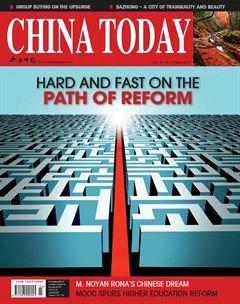Voices
“In Russia we see Chinas fast growth as a positive factor for development of the whole world. Although both China and Russia advocate harmonious foreign relations, unfortunately this is not a commonly observed phenomenon. Sometimes expediency prevails, and concern for short-term benefits outweighs strategic interests. In such circumstances it is important to set a good example. China and Russia have established a strategic partnership of equality not based on expediency. My long experience of working for international organizations tells me that close coordination and cooperation between our two countries such as this is good for the world at large.”
Russian Ambassador Andrei Denisov made the remarks in an on-line people.com.cn program in which he and former Chinese ambassador to Russia Li Fenglin talked about the Sochi Winter Olympics and Sino-Russian friendship.
“Visiting the shrine which honors Japanese war criminals could only further open the wounds left by WWII,”
said Major General James Whitehead Jr., chairman of the board of the Flying Tiger Historical Organization.
After Japanese Prime Minister Shinzo Abes recent visit to the controversial Yasukuni Shrine, wherein 14 Class-A war criminals are honored, the organization wrote a letter to Cui Tiankai, Chinese ambassador to the U.S. The letter stated that the Flying Tiger Historical Organization shared the U.S. governments disappointment in Abe and his “disregard for the feelings of those people who were so brutally impacted by the Japanese military during WWII.”
Mr. Whitehead said that the U.S., along with many other nations, had cautioned against and condemned the visit, and that the stated goal of the organization is to promote continued friendship, cultural understanding and cooperation between the American and Chinese people.
Caijing
Issue No. 3, published on January 20, 2014
Saving Sino-Australian Iron Ore Mines
On December 2, 2013, the MAGNETIC II set out from Port Cape Preston, Western Australia, carrying four tons of fine iron powder. With a beep of the horn, Chang Zhenming, chairman of CITIC Group and CITIC Pacific, and Colin Barnett, Premier of Western Australia, announced the first successful barging of the joint Sino Iron Project. This particular batch of fine iron powder was heading for mini capesize bulk carriers waiting 10 km away and then on to CITIC Pacifics Special Steel iron ore pelletizing plant in Jiangdu City, Jiangsu Province in China.
The Sino-Australian iron ore project has been the largest investment by Chinese enterprises in overseas mineral resources to date, and is one of the few with 100 percent of Chinese holdings in the field of resources in Australia. It is also the largest greenfield investment project by Chinese enterprises overseas.
The project was initiated in 2006 with a planned investment of US $4.2 billion and was expected to be completed and come into operation in 2009. But during the process, it was found more and more investment was needed, which briefly halted the project several times.
Because of this, and against the backdrop of the global financial crisis, the project had been regarded as a failure in Chinese overseas ventures, and encountered reservations in the industry and capital market. Seven years after its launch, US $10 billion had been invested in the venture, and to finish the project, more investment still will be needed. But, in contrast to unfinished iron ore projects by Sinosteel Midwest Corporation and China Metallurgical Group Corporation, among others, this project was given new life and finally put into operation thanks to the persistence and belief of Chang Zhenming and other supporters.

